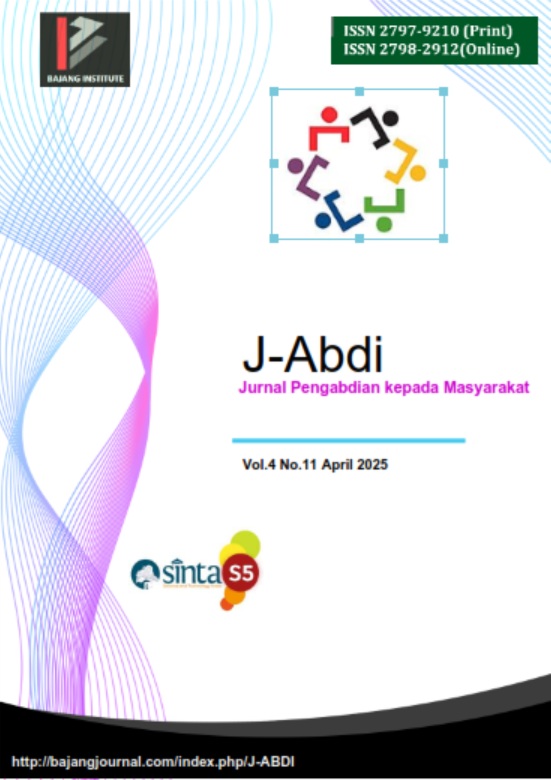SOSIALISASI TERHADAP GEN Z TENTANG SISTEM PEMILIHAN DAN MEMAHAMI TATA CARA PROSES PEMILIHAN
DOI:
https://doi.org/10.53625/jabdi.v4i11.10010Keywords:
Gen Z, Voting, Socialization, Participation, DemocracyAbstract
Generation Z (Gen Z), the younger demographic increasingly entering voting age, plays a crucial role in the democratic process. However, their understanding of the voting system and the procedures involved still needs reinforcement. This article discusses the importance of socialization among Gen Z regarding the voting system and understanding the procedures involved. Through an educational approach relevant to the current context of technology and time, socialization can enhance their participation and comprehension within the democratic process. This socialization can be carried out through various media, such as social media platforms, voter education campaigns, and formal educational programs in village. By understanding their rights and responsibilities as voters, Gen Z can become more actively involved in general elections, selecting candidates who represent their values and aspirations. Awareness of the importance of participation in the democratic process and understanding the mechanisms of voting can strengthen the foundation of an inclusive and sustainable democracy
References
Amir, M. (2020). Keserentakan Pemilu 2024 yang Paling Ideal Berdasarkan Putusan Mahkamah Konstitusi Republik Indonesia. Al-Ishlah: Jurnal Ilmiah Hukum, 23(2), 115–131. https://doi.org/10.56087/aijih.v23i2.41
Bounegru, L. G. (2020). A field guide to “fake news” and other information disorders. European Journalism Centre.
Dimock, M. (2019). Defining generations: Where Millennials end and Generation Z begins. Pew Research Center.
Haris Zulkarnain, M., & Saufi, A. (2021). URGENSI PENDIDIKAN PEMILIH MUDA MENUJU PEMILIHAN UMUM 2024 YANG BERINTEGRITAS. Jurnal Bawaslu Provinsi Kepulauan Riau, 3(2), 154–173. https://doi.org/10.55108/jbk.v3i2.262
Hidayaturrahman, M., Hasan Ubaid, A., & Setia Wardhani, W. D. (2023). Strategi Mendidik Pemilih Milenial Cerdas pada Pemilihan Umum 2024. Abhakte Jurnal Pengabdian Kepada Masyarakat, 1(2), 33–44. https://doi.org/10.24929/abhakte.v1i2.3055
Irwandi, M. D., Akbar, R., & Santa, R. (2023). Analisis Kesadaran Generasi Muda Indonesia Dalam Dunia Politik. Jurnal Sosio Dan Humaniora (SOMA), 2(1), 107–116.
Iswanto, D., & Pamungkas, D. B. (2023). Increasing Public Participation In The 2024
Elections: A Stakeholders Mapping Analysis Approach. Journal Of Transformative Governance And Social Justice, 1(2).
Kusumadinata, A. A., & Suryatna, U. (2024). Prefalensi Pemilih Muda dalam Partisipasi Politik di Tahun 2024. Karimah Tauhid , 3(2).
Kuswati, Y. (2019). Penyuluhan Pendidikan Politik Bagi Pemilih Pemula Karang Taruna Kecamatan Panyingkiran. JURNAL PARAHITA ABDIMAS: Jurnal Pengabdian Masyarakat, 1(1), 52–62.
Lopez, N., & Schoellman, T. (2020). Civic education and political participation . Journal of Public Economics, 104–244.
Ryfe, D. M. (2018). Opinion formation and expression in a digital age: A study of young Americans. Routledge.
Setiawan, H. D., & Djafar, TB. M. (2023). Partisipasi Politik Pemilih Muda Dalam Pelaksanaan Demokrasi di Pemilu 2024. Populis : Jurnal Sosial Dan Humaniora, 8(2), 201. https://doi.org/10.47313/pjsh.v8i2.2877
Sjafrina, P. A. G. (2019). Dampak Politik Uang Terhadap Mahalnya Biaya Pemenangan Pemilu Dan Korupsi Politik. Jurnal Antikorupsi INTEGRITAS, 05(1).














